World Ocean Day: Stories From Ocean Explorers
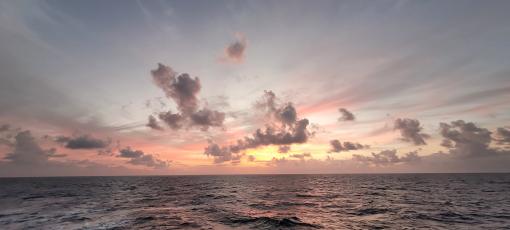
Ocean Exploration Trust seeks out new discoveries in geology, biology, and archaeology while exploring little-known regions of the world’s oceans and shares expeditions with explorers worldwide via live telepresence. The International Nautilus Corps of Exploration consists of engineers, scientists, technologists, educators, students, and mariners -- all contributing in various ways to our expeditions at sea and onshore.
In honor of World Oceans Day, we invite you to hear from some of our Corps of Exploration about their unique ocean-related careers, how they got where they are, and what advice they have for others going along the same path.

Coralie Rodriguez
Geologist
University of Rhode Island, Graduate School of Oceanography
“As a Ph.D. candidate at the University of Rhode Island’s Graduate School of Oceanography (GSO), I’ve had the pleasure of studying geological oceanography and am also interested in science communication and policy. I specifically study the geochemistry of ferromanganese (Fe-Mn) crusts, which are rocks formed over millions in the deep sea. I love being able to travel and do fieldwork, and I’m always excited to meet people interested in exploration and the advancement of the scientific process!
“I honestly fell into this field. I studied geology as an undergrad. When I applied to graduate school, my advisor had a project available through NOAA OECI. The project was interesting, and I’ve been fortunate to go to sea on research cruises and present my research at different conferences. Sometimes I’m at a conference networking with collaborators; other times, I’m at sea doing deep-sea exploration. I can also be in class learning about Marine policy, or I can just be conducting my own research at our labs at GSO.
“The ocean is so good at protecting us! Phytoplankton in the ocean are responsible for supplying ~80% of the world’s oxygen. In addition, the ocean acts as a buffer for climate change because it can absorb extra heat from the atmosphere and carbon dioxide. We wouldn’t be here if it weren’t for the ocean! I hope we can continue to explore the ocean. There’s so much earth history down there and so much more to learn about! Ask questions, be curious, and say yes to opportunities to explore!”
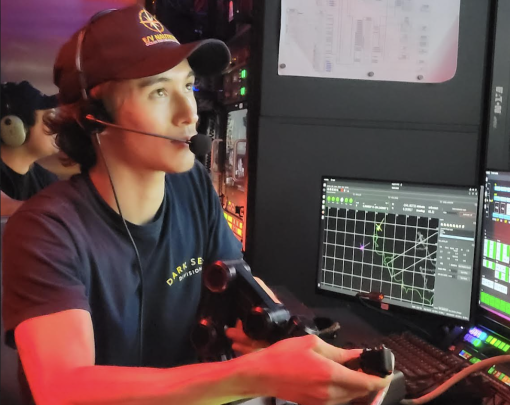
Wren Sakai
Engineering Graduate Student
Carnegie Mellon University
“I am an ROV engineering intern, and I assist the ROV team in keeping the equipment maintained and act as an Atalanta pilot during dives. I most enjoy using the manipulator arm to take samples! I love robotics, but I also love being outside and getting my hands dirty during fieldwork. Ocean exploration combines these two interests well, so working with ROVs was a natural choice for me. The excitement of spending time in the control van keeps me going when the surface work gets rough.
“I was a robotics engineer for a mariculture company during my first ocean-related job. We routinely deployed equipment in pelagic waters, and I had the opportunity to do engineering work on freedive. One day I was in the water, and a whale shark emerged from the depths and nearly ran right into me! Ever since then, I’ve been hooked on ocean-related work. The oceans produce over half of the world’s oxygen! So we better keep it in good health if we enjoy breathing.
“I am particularly fond of Bluefin Tuna! They are beautiful animals, and maguro nigiri and sushi are culturally significant for my family and me (we’re Japanese). However, I don’t eat tuna because they are very overfished and not respected by humans. I hope that the world’s Tuna fisheries can become sustainable.
“My advice for people entering the field? Don’t doubt yourself! If you work hard and act with integrity, you can really do anything! Don’t be afraid to set seemingly wild goals for yourself and work to achieve them!”
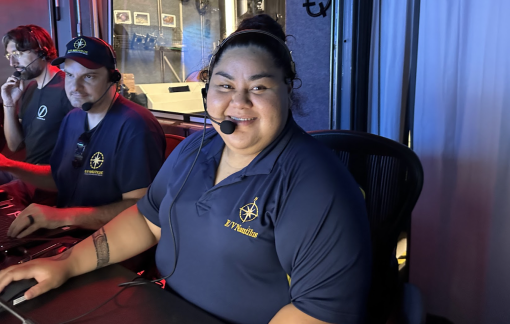
Anneliese Haleck
Secondary Teacher, Samoana High School
American Samoa Department of Education
“I am a local educator at our high school in American Samoa, Samoana High School, home of the mighty sharks. I teach Biology and Marine Science. I desire to impart that knowledge to the next generation. I love it when my students’ faces light up when they finally understand a concept.
“My parents, Lauvao Stephen Haleck & Melesete Haleck, inspired me to pursue an ocean-related career. Growing up, my dad would take me fishing on his boat while my mom would teach us ‘reef fishing’ using our bare hands and simple man-made tools. They would then educate me on the different uses and cultural significance of the body parts of the species we caught.
“I love being on E/V Nautilus and connecting with different people from all walks of life who are just as passionate, if not more, about the ocean. Seeing firsthand and learning how much goes into deep ocean exploration has definitely given me a newfound perspective. This experience is life-changing. I hope the major issues our ocean faces today will be resolved through our future generation uniting to protect that which is precious, our ocean.
“I advise others to go into the career you are passionate about, being sure and confident. Persevere through trials and make no room for self-doubt. You can succeed in any career that you set your mind to. You can be a geologist, biologist, engineer, pilot, and more. It is never ‘I can’t,’ it’s always, I CAN.’”
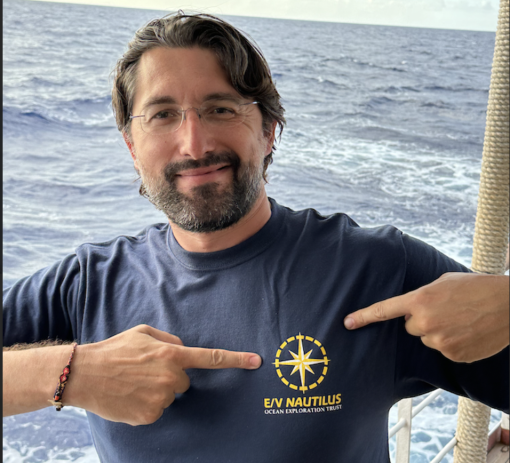
Dr. Pablo Sobron
Partner Technology Lead
Founder, Impossible Sensing
“My journey began peering into the ghostly remnants of Mars’ past oceans and grew as I explored the far-away seas of Europa and Enceladus. The intrigue led me to an unsettling realization: our technology was ill-prepared to decipher these alien waters’ profound secrets.
“This sparked a pivot, a return to Earth, the blue planet. I took up innovation, creating new tools to explore and understand our deep seas. The immediate goal was simple yet ambitious: understand Earth’s oceans better to equip us for eventual voyages to alien seas.
“But as I dove deeper, another realization stirred within me, a compelling motivation that now fuels my innovation engine. The ocean holds the key to a sustainable 1.5-degree future. Hidden in its depths are solutions to our most pressing challenges: climate change, energy security, and food scarcity. If unlocked responsibly, the potential for responsible marine mineral extraction, carbon sequestration, and seaweed farming could be pivotal in creating the sustainable planet we all want to live in.
“Driven by this understanding, I dedicated my efforts to forging a path toward a sustainable blue economy, which has the potential to nourish and power the world and unite it. Just as the ocean once connected civilizations in the early days of navigation and trade, my vision is for it to be a force of unity again. An ocean that fosters cooperation, kindles shared hope, and steers our planetary home, the only one we’ve ever known, towards a brighter future for all.”
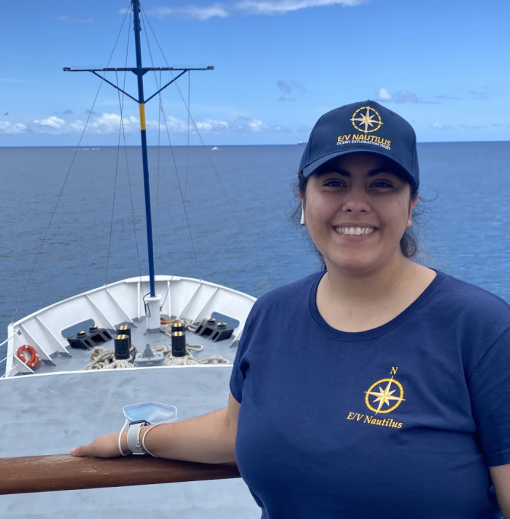
Guadalupe Zapata
Animal Science Undergraduate
Tuskegee University
“I am currently an undergrad at Tuskegee University, majoring in animal science. I plan to work within marine life after I graduate, for I have a true love and passion for the ocean. What I like most about the ocean is that it’s like a whole new underwater world that few people can see or explore.
“I have always dreamed of working within the ocean but never knew how to pursue it. My mother has always encouraged me to try new things and put myself out there! It wasn’t until I joined OE (Ocean Exploration) Club at Tuskegee that I opened my eyes to the many opportunities the ocean offers. I haven’t had much experience so far, but working on board E/V Nautilus has been the highlight of my career path. I love getting to explore the deep ocean has been amazing!
“My hope for the ocean in the future is that people have learned to appreciate it. I believe we should treat the ocean as our home and think of the animals in the ocean as if they are our pets. You wouldn’t want your home dirty or your pet harmed by trash, so learn to care for our environment.
“There aren’t any beaches where I grew up, so I found my love for the ocean by visiting other places, such as Florida. My advice is to do some research, travel, and explore. Make sure to ask questions while you are there. Keep pushing even when it gets hard or you feel like giving up. It’s good to ensure you have a great support system during the process because I couldn’t have done it without my support system!”
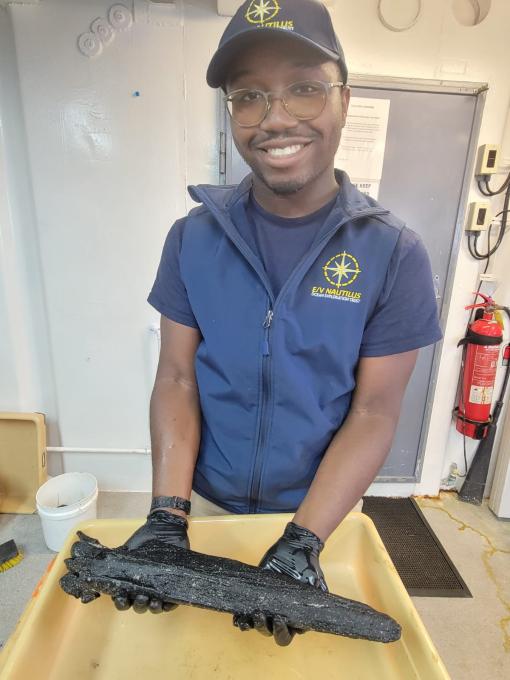
Daniel Price
Geologist and Science Communicator
Alum of West Virginia University
"I always had an interest in ocean science growing up. Vacations to the beach and visiting aquariums were special times for me to develop a fascination with the aquatic world. My favorite sea creatures are jellyfish because they look so alien, yet they live in waters worldwide. This passion for science and discovery motivated me to a career in STEM, where I majored in geology at West Virginia University. When I learned about Nautilus Live, it felt like honoring my childhood to be a part of such a voyage!
"My ocean-related career is in geosciences and science communication. I am currently aboard the E/V Nautilus as a Science Communication Fellow. I engage with the public on our mission through love ship-to-shore interactions, broadcasts, and other media. What I love about my job is getting to talk about what I am passionate about - science! - and being cross-disciplinary. I get to help in our wet lab with samples, assist engineers with our ROVs, and work with people of many backgrounds.
"If you are having trouble finding where to start or how to get to where you want to be, start with Google. It sounds simple enough, but googling careers in ocean science and pathways into it is how I learned about many opportunities. Networking is also crucial, getting to know people in the fields you are interested in. And most importantly, keeping your doors open to many opportunities that come your way. You'll never know where it may take you!

Exploring Deep Sea Habitats Near Kingman Reef & Palmyra Atoll
Our first live expedition of 2023 brings us back to the region of Kingman Reef and Palmyra Atoll as part of our ongoing effort to explore the deep ocean in and around the Pacific Remote Islands Marine National Monument (PRIMNM) through the Ocean Exploration Cooperative Institute.





